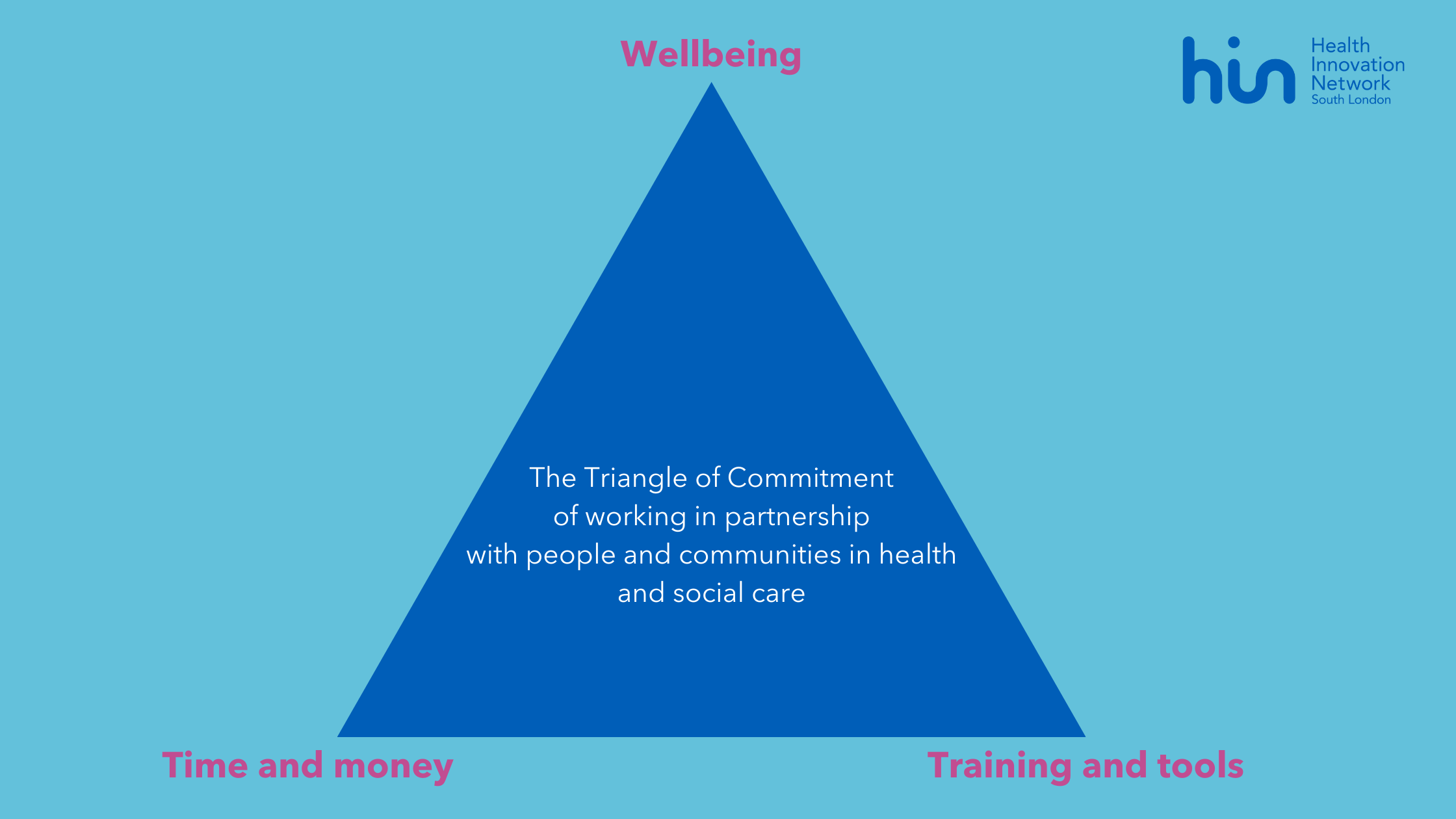This article was written by Aurora Todisco, a Lived Experience Partner at the Health Innovation Network. Find out more about our Lived Experience Partner roles and how their work forms an important part of our Involvement Strategy.
Involving individuals with lived experience has become essential for service improvement in health and care. The Health and Social Care Act 2012, in conjunction with NHS England’s Statutory Guidance on Working with People and Communities, has established legislative obligations to engage these essential stakeholders. However, we know that many organisations struggle to create environments that support meaningful partnerships with people and communities.
To address this challenge, we have introduced the "Triangle of Commitment", a framework which serves as a visual tool to highlight the key elements necessary for fostering productive working relationships between healthcare professionals and individuals with lived experience.

The three “sides” of this Triangle are:
Time and money
-
- Financially supporting those involved: . By covering the expenses of Experts by Experience and community groups you ensure contributing to your work is not a source of financial burden. Payment formally acknowledges the contribution of people and communities to your projects and fosters more equitable partnerships.
- Flexibility: recognising different reimbursement preferences is crucial for inclusivity. Providing options such as bank transfers, vouchers, training opportunities, or charitable donations ensures people receive compensation which is both appropriate and valuable given their individual circumstances.
- Efficient use of time: individuals with lived experience generously contribute their valuable time. Organisations must respect their schedules and commitments.
- Dedicated time for professionals: healthcare professionals should have dedicated, protected time to nurture and support these relationships. This ensures that the engagement process is given necessary attention and emphasises its significance within the organisational framework, demonstrating the organisation's commitment to involvement.
Training and tools
-
- Skills and knowledge: equipping individuals with lived experience with necessary skills and knowledge ensures they can participate equally with staff and other project members. This includes providing basic training on organisational tools and procedures.
- Long-term commitment: organisations can demonstrate long-term commitments by implementing training and development plans for Experts by Experience. This may include providing access to training and/or establishing formal support or line management structures, thereby facilitating personal growth and professional development. Moreover, organisations can empower people through establishing mentoring relationships which can create a supportive environment where individuals can gain a deeper understanding of how to effectively apply their knowledge and skills. These efforts not only enhance the capabilities of those with lived experience but also reinforce the sustainability of partnerships between services and service users.
- Inclusive communication: communications, meetings and events should cater to diverse needs, including disabilities and language barriers. Power imbalances should be considered and mitigated against.
- Dedicated training for professionals: organisations should commit to supporting professionals to continually improve their skills and understanding in the context of working with people with lived experience. This could include training on ethics, developing wider cultural understanding, or effective facilitation of workshops and meetings.
Wellbeing
- Creating a safe space: every voice should be heard and valued. Organisations should actively cultivate an atmosphere of empathy, safety, trust and respect. This encourages individuals to express concerns, provide honest feedback, and seek support when necessary. It is particularly important when discussing sensitive experiences or topics.
- Time for reflection: project plans should include dedicated time for debriefing and reflection involving all parties. This goes beyond "closing the loop" on project outcomes and offers an opportunity for continuous improvement. Open and honest discussions about challenges and successes contributes to refining processes and strengthening mutual understanding. This benefits the immediate project and enhances the overall relationship between the organisation and the population it serves.
- Dedicated support for professionals: dedicated wellbeing initiatives for professionals should support, and enhance, the mental and emotional health of individuals in demanding fields such as health and care involvement. These initiatives should focus on stress management, mental health support, work-life balance, and physical wellbeing, aiming to prevent burnout, foster resilience, and create a supportive work culture.
We believe the Triangle of Commitment provides a useful structure for guiding the development of a positive environment for involving people and communities in improving health and care. By addressing the dimensions of financial support, time management, skills development, and emotional wellbeing, we pave the way for strong, equitable partnerships which result in positive outcomes for everyone involved.
This commitment underscores the significance of empathy, respect, and a dedication to ongoing improvement in the pursuit of enhanced health and care services. By embracing these principles and practices, it is possible to create a more inclusive, collaborative, and responsive healthcare system that truly serves the needs of the community. In doing so, we not only honour the legislative obligations and guidance of health and social care but also promote a culture of genuine partnership and positive change.

